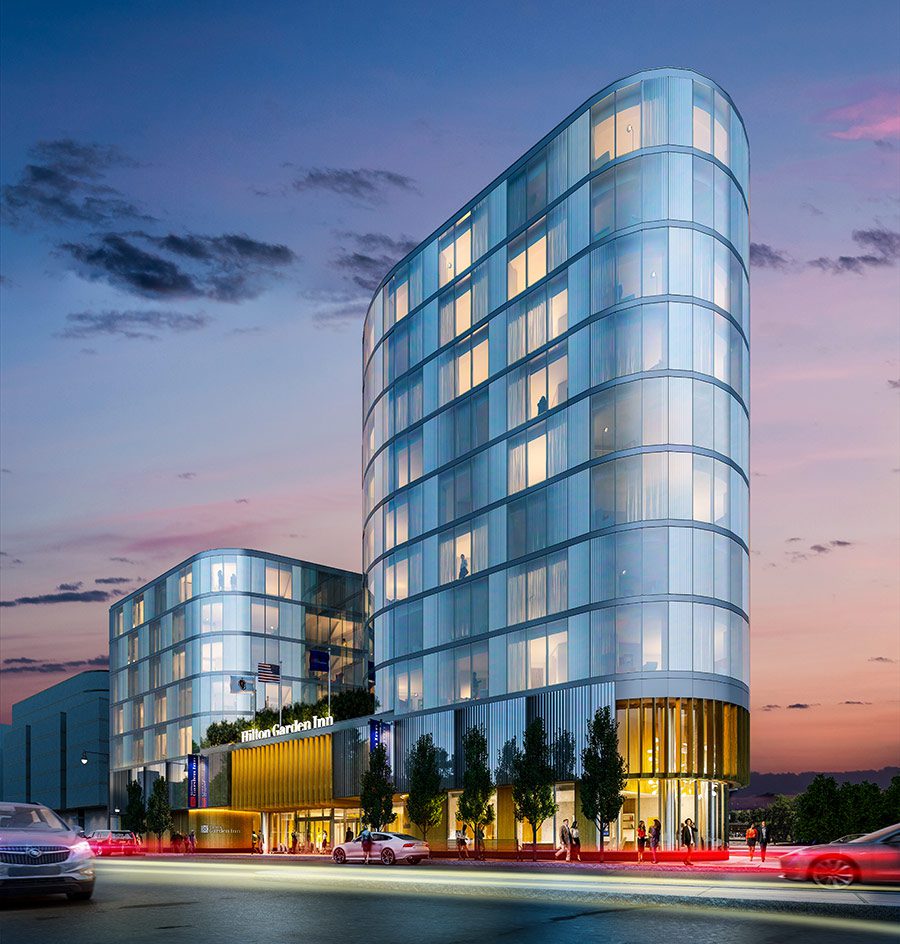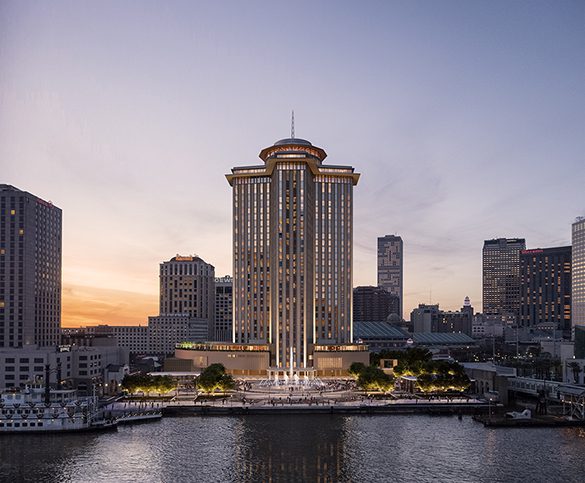Despite Closed Construction, American Architects are Working On
arkitekten. - June 16, 2020

By Linda Marlevi
While Sweden has given companies and individuals some freedom, the United States has imposed tough restrictions to prevent the spread of COVID-19. In the particularly hard-hit states of New York and Massachusetts, construction sites have closed, the architect’s offices converted to work-from-home scenarios, and the procurement has slowed.
The bike path and sidewalk abruptly end. This has been the case since the start of construction of the Hilton Garden Inn hotel in the municipality of Brookline, which is adjacent to Boston and several Massachusetts hospitals. In many of Boston’s streets, motor traffic has dropped dramatically since Massachusetts closed down unnecessary operations. But on the streets that surround two of the hotel’s sides, motor traffic continues to rush by. A third facade faces the Emerald Necklace, an extensive park system that is currently a thriving oasis and popular retreat for masked residents who cycle or walk along the park’s waterways.
Everything inside the construction site is still. Through the glass facade gleams metal shelves without boards and carriers without ceilings. The inauguration was to take place in September this year and right now activity should be high to get everything ready in time. As a result of the COVID-19 pandemic, the municipality of Brookline on March 18 appealed to all builders to pause their projects and on March 24, Massachusetts closed all of the state’s unnecessary construction. The hotel will now be ready at the earliest in November. The bike path and the sidewalk will continue to be closed for a good while.
The hotel is designed by CambridgeSeven. In the middle of March, their physical office, which is a stone’s throw from Harvard University in Cambridge, was closed. Since then, they have around 60 employees working from home. When I call CEO Gary Johnson, I am met by a nice voice. He answers from his home office in Lexington, a municipality in Greater Boston. Gary Johnson is still optimistic, despite the difficult situation. He thinks that a glimmer of light in the new life is more time with the family, which he likes to spend cooking and walking with his wife. He is satisfied that no employees have been sick or needed to quit. None of their clients have canceled ongoing assignments, and the workload is unchanged.
Following the record-breaking decline in US architectural firms’ billing in March, the decline in April became even greater, according to a report from the American Institute of Architects (AIA). In both March and April, the decline was greatest in the northeastern United States. The number of new assignments also dropped drastically, as CambridgeSeven also noticed. Since March, the company has received only minor assignments and additional work. Although the workload looks reasonable over the next six months, Gary Johnson is worried about what it will look like in a year.
“It is very difficult to market our services when people are nervous about an economic downturn.
There are also far fewer tenders to tender for. Gary Johnson is surprised that public procurement is basically non-existent:
“I thought the politicians would see this as an opportunity to create infrastructure projects needed in the region and the country.”
Neither do private clients initiate new projects. When the restrictions ease, however, Gary Johnson believes the missions will be more, albeit different:
“I think there will be more renovations and interior design assignments for social distancing, and redevelopments that reduce the risk of spreading infection between people.”
Although CambridgeSeven has been granted several building permits since mid-March, several architects said during a video meeting with AIA Massachusetts in May that the law process is basically stalled since the municipalities moved on to work from home. They fear delays in their projects when the buildings open up.
The state of emergency in Massachusetts gives municipalities the right to postpone consultation meetings, which complicates the legal process. But, there are examples of creative solutions. In the municipality of Sunderland, meetings have been arranged outdoors, where citizens have been invited to bring their own chairs. In Lexington, meetings are held via video. Gary Johnson thinks these video meetings proved effective, even though he believes more had turned up for a physical meeting. Other architects testify to increased participation, but consider that there is a fairness problem as not all citizens have access to the internet.

Two-thirds of construction companies said in early May that builders had stopped planned construction around the United States because of COVID-19, according to a survey by Associated General Contractors of America. Companies in the northwestern United States stated that as many as four-fifths of the construction was halted, mostly because of the state’s or municipal’s ban on unnecessary activities. Instead, for the United States as a whole, the most common cause was the builder’s concern for the spread of the virus at the construction site, followed by the builder’s expectation of reduced demand. In order to reduce the spread of infection, new routines have been introduced on those buildings that remain open or have reopened. Mandatory hand washing and temperature control have been introduced on one of CambridgeSeven’s projects in New Orleans.
On May 18, construction sites opened again in Massachusetts. In the municipality of New York, construction sites may start to open on June 8. However, both Massachusetts and New York have introduced new requirements for contagion measures, such as social distancing.
“I suspect it will slow down the pace of construction somewhat, but I think we will find ways to handle it,” says Gary Johnson.
In the US, site visits are often included in the architect’s scope. For fear of breaking the contract, some architects have completed the visits to their projects hat are continuing. CambridgeSeven, on the other hand, has decided not to visit the projects at all. Instead, they have increased the number of telephone and video meetings as well as the review of images from the construction sites. Gary Johnson thinks everything will go back to what it was like before COVID-19, but it will take time – maybe years.
“It will look very different in the coming years. More people will want to work from home, at least part-time, and more construction sites will use digital platforms. At the same time, I think people are very social. We will like to travel again so that we can see things with our own eyes.”
Architectural firms in the United States employ nearly 200,000 people. Unlike in Sweden, the architect title is protected in the US, and the architect’s license is valid per state. Massachusetts has a total of more than 7,500 architect licenses and in New York nearly 20,000. In addition, there are a large number of architectural degrees, which are not licensed in the United States.
One of them is Lloyd Helen, who works at Cooper Robertson in New York. For Lloyd Helen too, the workload remains unchanged and Cooper Robertson has managed to retain all employees since the COVID-19 outbreak. The architectural firm, with around 35 employees, chose to introduce working from home even before New York closed all unnecessary workplaces. Starting to work from home has not been the most difficult change for Lloyd Helen. Instead, it was the curfew, which was in place until May 28. Since the beginning of March, he has been working at his kitchen table, where he also sits when I call. Behind him on the white wall hang color swatches in shades of gray.
Cooper Robertson had no policy on working from home prior to the COVID-19 outbreak. Lloyd Helen thinks it is positive that the industry has now been forced to develop the use of digital solutions. He thinks the transition to working from home has been smooth and doesn’t feel that productivity has gone down.
“The proof is in what we have done in recent months. It is not possible to argue that working from home does not work when we are still producing and assignments are progressing efficiently,” says Lloyd Helen.
Lloyd Helen believes that working from home will become more common in the future and that it will be in demand for job interviews. At the same time, he thinks there is great value in office culture, especially in New York where many live in small apartments.
Gary Johnson also feels that the transition has been smooth. Productivity has not diminished and he has surprised himself with being more efficient when working from home.
“In the past, we didn’t like working from home. We felt that what we do requires a lot of collaboration and discussion, to sit together, sketch and come up with ideas. However, we have discovered that we can do most things well on the computer. It’s been an eye-opener,” says Gary Johnson.
Physical offices were reopened on June 1 in Boston and on May 25 in the rest of Massachusetts, albeit with only 25 percent capacity. CambridgeSeven is now planning to reopen the physical office. Employees will initially be there every other week. They will have mask requirements and limit the number of participants in the meeting rooms. All doors will be open so no one has to use the door handles.
After the first phase of reopening in New York on June 8, it will take at least two weeks before the second phase is introduced. Then, among other things, physical offices will be allowed to open again. Lloyd Helen believes it will take longer before everyone returns to work at Cooper Robertson’s physical office. For the time being, work continues from the kitchen table.